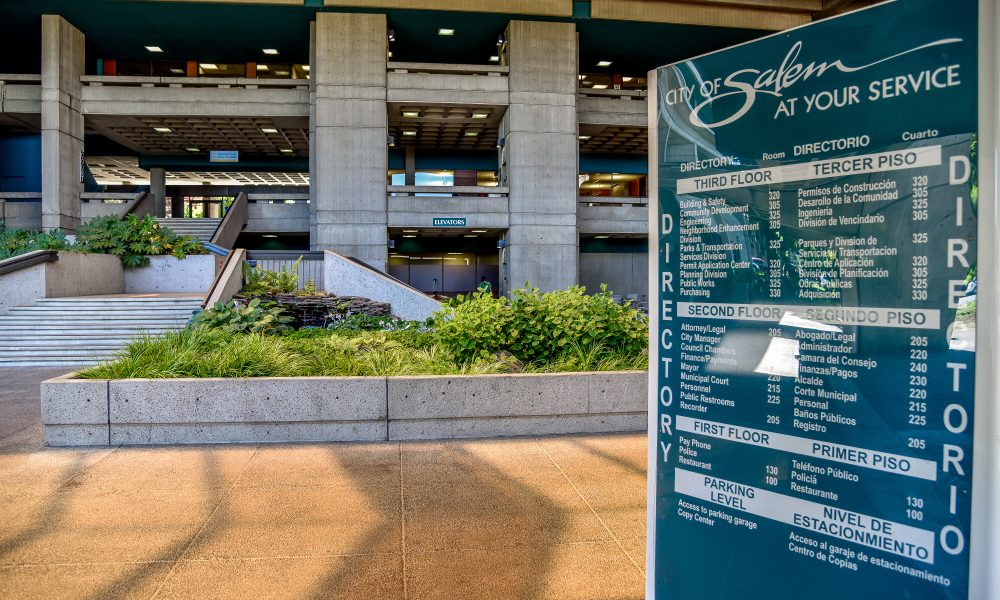Salem city councilors showed little interest in “extreme” scenarios to balance the city’s budget during discussions Wednesday, instead focusing questions on small tweaks to a staff plan that would cut positions across a variety of city departments.
“There’s no good options here, and so we’re just looking for the least terrible,” Councilor Trevor Phillips said.
The discussion came as city voters will decide Nov. 7 whether to approve a wage tax that would bring in an estimated $27 million a year. The city’s 2024 budget was approved assuming revenue from the tax was forthcoming. If voters reject the tax, the city instead says it needs to cut millions in spending on services to preserve the city’s financial reserves.
Councilors made no decisions Wednesday and will next hear a proposal for convening a revenue committee to look into alternative fund options. The city doesn’t have another work session scheduled as of Friday, said spokeswoman Courtney Knox Busch.
Councilors last discussed potential cuts in a Sept. 18 meeting after city leaders presented a baseline proposal, which includes closing the West Salem library and homeless shelters, and cutting police, firefighters and parks maintenance.
During the September meeting, councilors asked to see hypothetical variations such as retaining public safety service levels, adding park rangers and expanding a homeless outreach and cleanup team or continuing to fund all homeless shelters. They reviewed those on Wednesday.
The hypothetical scenarios to keep the suggested services required deep cuts in other areas, including closing the main branch of the Salem Library and Center 50+
Read more about those scenarios here:
During Wednesday’s meeting, City Manager Keith Stahley said the proposed options represented extremes, which could be changed into an “infinite” number of recombinations using councilor input.
“We’re working with a zero-sum game here,” he said. “If you put money in one place you’re going to have to take it from another place.”
Councilor Trevor Phillips asked how much could be saved from reducing library hours by one day a week, which Deputy City Manager Scott Archer said would save around $20,000 per day, according to a rough estimate of dividing its total budget by the days it’s open.
Phillips said he would prefer to cut a day at the library in order to sustain and potentially add staff to the homeless outreach team so it can operate seven days a week, rather than its current five.
Mayor Chris Hoy said he wants to see the team grow too, but wasn’t sure it was feasible.
“I’m having a hard time wrapping my head around increasing a program when all of these others are having such drastic decreases,” Hoy said.
Phillips said he understands the perspective, but had concerns about addressing the future impact of cutting funding to homeless shelters.
Vacancies and furloughs
Public and council discussion of the city’s budget deficit has focused on the number of vacant city jobs, currently around 80.
Thirty-five of those jobs have been vacant for over six months. Those include 10 or 26 police and 12 of 16 fire vacancies, according to a city report.
Other vacant positions citywide include custodians, analysts, managers and library assistants.
Deputy City Manager Krishna Namburi said that the city has 790 general fund positions and a vacancy rate of 10%, which is normal for an agency of Salem’s size. By comparison, Hillsboro’s vacancy rate is 10%, Gresham’s 13% and Beaverton’s 7%, she said.
She said a vacancy rate of at least 5% will always exist due to turnover, so cutting vacancies would ultimately shrink the number of staff and create additional vacancies.
“If we were to eliminate those vacancies, our number of funded positions becomes 720. That will create, let’s say 5% vacancies or 7% vacancies… that would create an additional 60 vacancies. My operating workforce now is 720 minus 60,” she said. “We would never be in a situation where we’re 100% filled.”
Councilor Vanessa Nordyke said a priority for her is that she doesn’t want to see any layoffs of people who have already committed to working for the city, as opposed to cutting vacancies.
An unpaid furlough day off for city staff would save around $366,255 in savings, or $166,585 for a furlough excluding public safety employees.
Namburi said a shorter work week would likely lead to much of those savings being spent on overtime needed by staff to complete their duties.
Furloughs would also need to be negotiated with unions. For the 23% of the workforce who aren’t unionized, staff listed concerns about existing issues with employee morale, work-life balance and a lack of interest in promotional opportunities.
What’s next
The city has until June at the latest to make its decisions about the first round of cuts. Eggleston said February would be preferred, when the city and budget committee start developing next year’s budget.
Next, the city will bring councilors a proposal of what the next revenue task force will look like. The city’s last revenue task force met in 2018, and their recommendations included adding the operations fee to utility bills and implementing a payroll tax.
The new task force would meet to explore ways to bring in more money, though at this point it’s unclear until the November vote whether payroll funds will be added to the city’s general fund pot.
Councilors will likely be participants in the task force, and shared their suggestions for the size, expertise and selection process they’d like to see from the group. Several said they wanted to maximize public input. The city plans to return with a proposal for forming the group in the coming weeks.
Contact reporter Abbey McDonald: [email protected] or 503-704-0355.
SUPPORT OUR WORK – We depend on subscribers for resources to report on Salem with care and depth, fairness and accuracy. Subscribe today to get our daily newsletters and more. Click I want to subscribe!

Abbey McDonald joined the Salem Reporter in 2022. She previously worked as the business reporter at The Astorian, where she covered labor issues, health care and social services. A University of Oregon grad, she has also reported for the Malheur Enterprise, The News-Review and Willamette Week.









